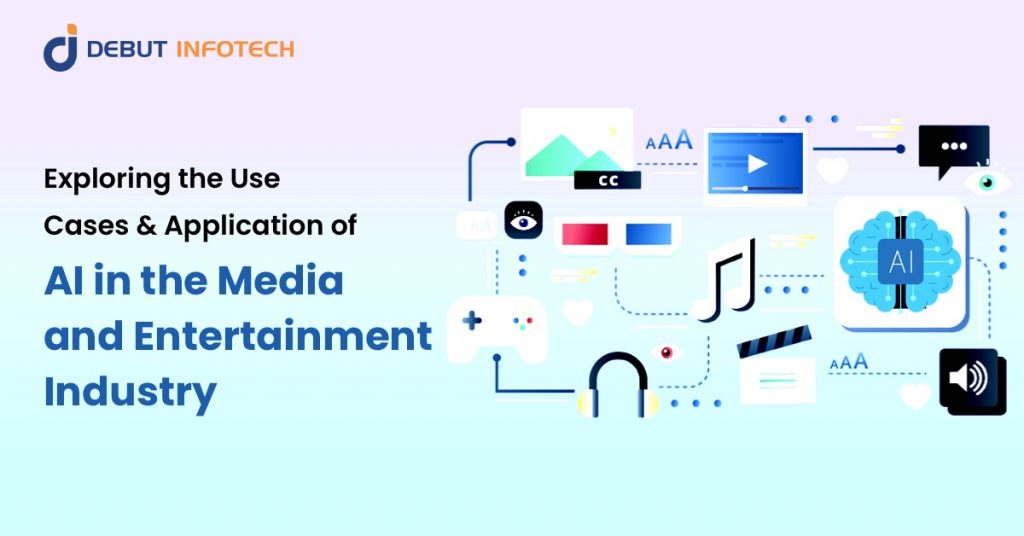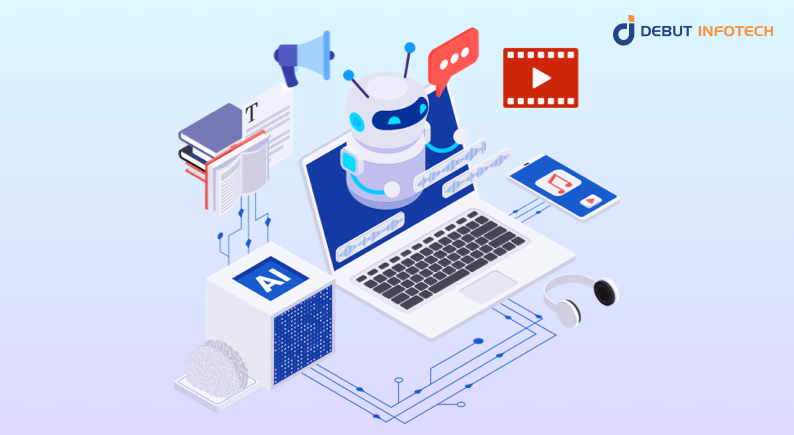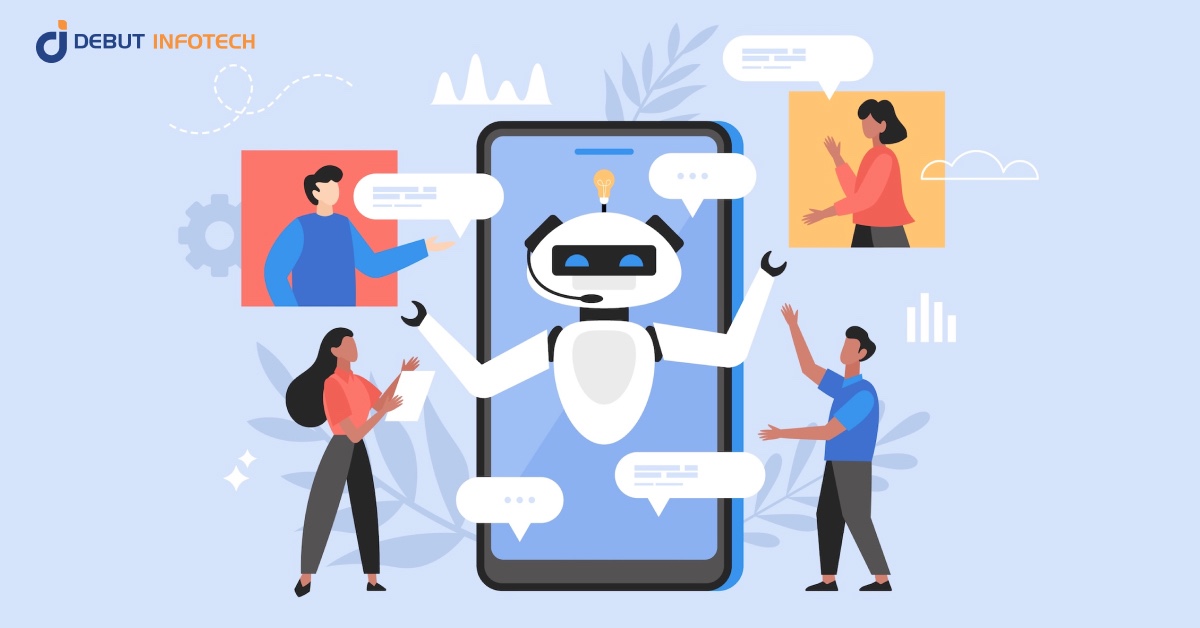
The media and entertainment industry are centered around innovation and attracting audiences with amazing technologies. Now, with the inception of artificial intelligence (AI), it is taking the boundaries to a formidable height, The media and entertainment industry is diverse and quite complex, including sectors such as movies, gaming, advertising, music, content creation, etc. AI has become a driving force in the media and entertainment industry. The use of AI in the media and entertainment industry has augmented and improved user experiences and has played an influential role in how content is made and delivered to users.
One of the most significant ways AI influences the media and entertainment industry is by adeptly customizing content and experiences to suit individual consumers. Today, AI plays a crucial role in the media and entertainment industry, from how content is created, disseminated, and appreciated to tailored suggestions to content generation. The media and entertainment industry are competitively working to develop AI technologies to pursue a worldwide audience.
In this article, we will talk about the applications of AI in the media and entertainment industry and AI use cases to consider various domains.
Elevate your media and entertainment strategy with our AI solutions.
Discover how we can enhance content creation, optimize audience engagement, and drive personalized experiences tailored to your business goals.
The Impact of AI On The Media and Entertainment Industry

AI helps with marketing and advertising that are performed through the media and entertainment space. By gathering data about consumer activities and patterns, AI algorithms enable companies to fine-tune promotional messages to target the target audience precisely. For example, several entities, such as YouTube and Spotify, artificially recommend content to users that aligns with their previous sight and purchasing record.
Customizing content and experiences to suit individual consumers is one of the critical influences of AI in the media and entertainment industry. The AI algorithm is used to deliver customized suggestions in music. This improves consumer satisfaction by demonstrating content aligned with individual specifications. Customized experiences keep players engaged in gaming by adjusting their difficulty level to match their skills and preferences.
AI-driven tools for music composition simplify the process for composers to create original soundtracks. Moreover, AI enhances content creation efficiency by automating tasks like video editing, proofreading, and even generating ad copy, resulting in cost reductions and heightened productivity.
AI impacts media and entertainment in the area of content creation. AI algorithms analyze large amounts of data to create content for a specific audience. Big companies like YouTube use machine learning development algorithms to analyze viewing data and recommend content to users. AI is additionally employed in generating novel types of content, such as virtual influencers and computer-generated actors.
AI is used to augment consumers’ experience in entertainment. For instance, chatbots are being used significantly to provide services to customers and give answers to frequently asked questions. Users are allowed to control their entertainment experience with technologies like voice recognition. Users can manage their entertainment experience with voice commands as AI-powered tools are embedded into the entertainment system, such as Google Assistant etc.
Related Read: AI Use Cases and Applications Across Key Industries
Use Cases Of AI In Media And Entertainment

Music
AI-generated music
An advantage of AI in music production is its ability to personalize the listening experience. Streaming services like Spotify and Apple Music already employ AI algorithms to recommend songs based on a user’s listening patterns, yet the technology can extend further. With AI-generated music, the software can craft personalized tracks tailored to a user’s preferences, mood, and even biometric data.
Music Recommendation
These systems use machine learning algorithms to analyze vast datasets covering music genres, artists, lyrics, and user interactions. Through this process, they precisely forecast and deliver music that resonates with users’ preferences, enriching their overall listening journey. The music recommendation system machine learning algorithm offers personalized content by accurately discerning the user’s preferences. This entails computers thinking akin to humans, analyzing each user’s past selections to anticipate their future preferences.
Film
Writing Scripts
AI has already started leaving its footprint in the domain of screenwriting. For example, numerous AI-driven tools and entertainment software development services have emerged to aid screenwriters in their work. These tools employ machine learning algorithms to recommend plot advancement, character dialogue, and script formatting.
Moreover, these tools presently function more as assists to human screenwriters than substitutes. While they can offer suggestions and insights, a script’s creative vision and emotional depth depend predominantly on the human touch.
Editing Movies
Artificial Intelligence provides valuable assistance in crafting captivating trailers and editing feature-length films. AI systems excel at pinpointing action-packed and emotionally resonant scenes, assisting editors in developing compelling trailers. Moreover, AI proves indispensable in editing complete films, utilizing facial recognition to identify central characters and pivotal plot-related scenes, thus streamlining the editing process for feature-length productions.
Advertising
Audience targeting and Segmentation
AI algorithms scrutinize user behaviour and preferences to offer tailored advertisements across diverse digital platforms. Through optimizing targeting, AI aids marketers in enhancing ad relevance, boosting performance, and maximizing return on ad spend. Using advanced automated targeting algorithms, AI sifts through extensive user data to generate more precise audience segmentation. This enhances the effectiveness of advertising campaigns by allowing advertisers to pinpoint particular and relevant groups.
Predictive analytics
AI in media and entertainment is used in predictive analytics, using data, statistical algorithms, and machine learning techniques to forecast future outcomes based on historical data. This entails utilizing data to anticipate consumer behaviour, preferences, and trends in marketing. Predictive analytics, driven by artificial intelligence (AI), has emerged as the marketing game-changer, offering companies a competitive advantage. By leveraging predictive analytics, you can make informed decisions, refine your marketing strategies, and elevate your customers’ experiences.
Content Creation
AI algorithms of automatically content generators changed the foundations of creativity by introducing generation of articles and scripts and even artwork. This is known as AI being “automated content generator” and then as the machine takes a part which they call as machine-creative workload. Furthermore, AI recommendation systems provide personalized content through the means she knows user’s likes on the basis of their preferences. Secondly, AI-based solutions revolutionized the field of visual effects and editing for film and video production, providing creative digital improvements alongside a more convenient and exhaustive editing handling. Moreover, AI algorithms have evolved, in terms of music composition and sound design as well, and they are already making music pieces which is quite an exciting development in the world of audio creation.
DebutInfotech, being a technology-based company, can effectively utilize AI to make informed decisions based on marketing and target audience, create customized services for their target audiences, and carry out more enhanced services to meet and satisfy consumers’ demands.
Advantages of AI in the Media and Entertainment Industry
- Cost Effective
AI for media and entertainment is used to cut costs so that there is no necessity to hire numerous costly specialists to tackle specific tasks, further liberating the budget. AI technologies accelerate multiple aspects of pre-and post-production processes, enabling creatives to swiftly progress to more challenging tasks.
- Better decision-making
When companies comprehend their audience preferences, artificial intelligence in media helps produce content tailored toward a specific audience. An AI consulting company plays a pivotal role in assisting media companies to make strategic decisions regarding the type of entertainment worth investing in. AI algorithms can rapidly analyze vast volumes of data sourced from various channels, including social media engagement and viewing metrics, to discern consumer preferences. The more comprehensive these analyses become, the more likely companies will make informed decisions regarding future investments.
- Marketing and Promotion
AI can scrutinize user data and trends on social media platforms to craft precise marketing and promotional strategies. This assists entertainment companies in effectively reaching their target audiences and enhancing their marketing efforts’ overall return on investment (ROI).
Read Aslo related blog: AI for Startups: Exploring Use Cases, Technologies and Benefits.
Disadvantages of AI in Media and Entertainment Industry
- Degradation
AI use in the media and entertainment industry risks becoming obsolete if human data scientists do not continuously train and assess it. The model and training data utilized to develop the AI will inevitably become outdated, making the AI obsolete unless it is retrained or programmed to learn and enhance itself autonomously.
- Lack of creativity and originality
While generative AI has the potential to expedite the creative process, there are numerous apprehensions surrounding the content it produces. Despite its ability to generate realistic and natural-sounding works through Natural Language Processing (NLP), machines still authored these creations. They often lack the passion, nuance, and perspective in human-created works. Since they primarily rely on analyzing existing scripts, any output generated tends to be a rehash of preexisting material. Consequently, these pieces seldom possess a genuinely unique perspective or vision.
- No improvement with experience
AI faces challenges in naturally acquiring knowledge from its own experiences and errors within the media and entertainment industry. Humans inherently possess this ability, endeavouring to avoid repetitive mistakes. However, developing AI capable of autonomous learning in this sector is challenging and costly. Therefore, it necessitates human intervention for continual improvement without independent learning programming.
Enhance your media business with AI-driven insights and solutions.
Connect with our experts to explore tailored AI strategies that can revolutionize your content, marketing, and operations.
Conclusion
The innovation of AI in technology, spearheaded by top AI development firms, has significantly transformed various industries, particularly the media and entertainment sector. These advancements have enhanced, bolstered, and increased productivity in numerous areas, including decision-making, marketing, and production. By leveraging AI, the media and entertainment industry can now achieve unprecedented levels of efficiency and creativity.
FAQs: Artificial Intelligence in Music, Media and Entertainment
A. Using sophisticated algorithms and machine learning methods in media and entertainment, known as Artificial Intelligence (AI), involves creating, enhancing, or customising content across multiple platforms, including movies, music, gaming, and television.
A. AI in content creation automates tasks like video editing, graphic design, and music composition, boosting creativity and streamlining production workflows.
A. Within the social media industry, AI is harnessed for content moderation, user behaviour analysis, and personalized content recommendations. It aids in identifying trends, refining advertising targeting, and boosting user engagement by offering tailored content.
A. Artificial intelligence is employed in music creation for various tasks, such as generating melodies, crafting chord progressions, and even composing entire pieces. AI tools empower musicians to explore new sounds and styles, thereby pushing the boundaries of music creation.
A. In music and media, AI is used for the composition of music, customized playlist generation, and analysis of user preferences. AI algorithms can enhance audio quality and mixing automation. AI in media assists in the creation of immersive audio experiences.
A. With AI, contemporary musicians like Olivia Rodrigo can create new content in seconds, synthesize sound-alike vocals, separate individual elements within a track, and much more.
A. Yes, AI can recognize music. Advanced AI algorithms are capable of identifying songs, genres, and even specific elements within a piece of music. Applications like Shazam use AI to recognize songs from just a few seconds of audio. Moreover, AI can analyze and categorize music based on various attributes such as tempo, melody, harmony, and even emotional tone.
A. AI music generators are computer algorithms that leverage machine learning techniques to compose music. By analyzing large datasets of music, these algorithms learn patterns and use that knowledge to create new music compositions.
A. AI tools and music generators offer valuable support for musicians and music creators, helping to spark new ideas, explore diverse musical styles, and automate specific tasks. However, these tools are best viewed as enhancements to human creativity, not replacements.
A. AI plays a significant role in media and entertainment, particularly in content development. By analyzing vast amounts of data, AI algorithms can create content tailored to specific audiences. For instance, Netflix uses machine learning to study viewing habits and recommend personalized content to its users.
A. AI is used in media production to automate editing, enhance content creation, and streamline post-production tasks. It enables personalized recommendations, generates scripts, and even assists in special effects, making the production process more efficient and creative.


